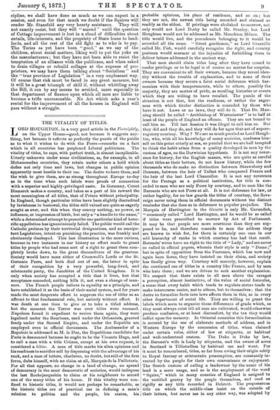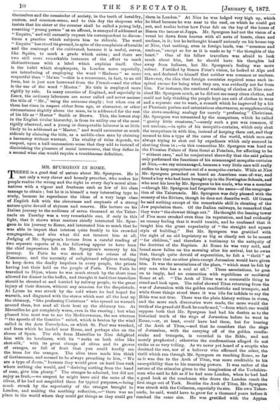THE VITALITY OF TITLES.
LORD HOUGHTON, in a very good article in the Fortnightly, on the Upper House—good, not because it suggests any- thing, but because it reflects so perfectly the puzzle of the public as to what it wishes to do with the Peers—remarks on a fact which in all countries has perplexed Liberal politicians. The vitality of titles, he says, with perfect truth, is almost inexplicable. Utterly unknown under some civilizations, as, for example, in all Mohammedan countries, they retain under others a hold which defies not only time and laws, but changes in public opinion apparently most hostile to their use. The desire to have them, and the wish to give them, are as strong throughout Europe to-day as in the time when such labels were proofs of connection with a superior and highly-privileged caste. In Germany, Count Bismarck makes a country, and takes as a part of his reward the most meaningless of all titles, that of Prince without principality. In England, though particular titles have been slightly discredited by lavishness in bestowal, the titles still valued are quite as eagerly sought as ever, and this when they convey nothing, no power, or influence, or impression of birth, but only a "a handle to the name," while a determined attempt to proscribe one particular kind of hono- rific appellation has ignominiously failed. The public would call the Catholic prelates by their territorial designations, and an omnipo- tent Legislature, intent on punishing the practice, was frankly and obstinately disobeyed. This last illustration is the more curious, because in two instances in our history an effort made to grant titles by people who had some sort of a right to grant them com- pletely broke down, to the great discomfiture of the grantees. Society would have none either of Cromwell's Lords or the St. Germain Peers, and both died out of use, the latter in spite of their recognition by a very powerful, long-lived, and aristocratic party, the Jacobites of the United Kingdom. It is only when society has accepted a title that it lives, but that acceptance conceded, nothing kills it, not even a change of man- ners. The French people believe in equality as a principle, and have established it as the basis of their social system, and for years made the most desperate effort to suppress the use of titles as an affront to that fundamental rule, but entirely without effect. It was death at one time to give or to take a titled address, but the moment the Terror was over titles were resumed. Napoleon found it expedient to revive them again, they were legalized under the Bourbons, used under the Orleanists, granted freely under the Second Empire, and under the Republic are employed even in official documents. The Ambassador of a Repubiic is addressed as M. is Due, the Republican candidate for Paris is denounced because he ought to be the Vicomte Hugo, and to call a man with a title Citizen, except at his own request, is considered a Vase. A man of title marks his ultra opinions and his readiness to sacrifice self by dispensing with the advantage of his rank, and a man of letters, charlatan, no doubt, but still of the first force, dubs himself, with no claim at all, Marquis de la Pailleterie. For all that appears, no change in a land of change, no spread of democracy in the most democratic of societies, would indispose the last Rochejacquelein to claim or his neighbours to accord one of the many titles of his house. If this vitality were con- fined to historic titles, it would not perhaps be remarkable, as the historic titles are of practical use in defining a man's relation to politics and the people, his status, his
probable opinions, his place of residence, and so on ; but they are not, the newest title being accorded and claimed as readily as the oldest. If privilege were abolished to-morrow, not only would not Lord Derby be called Mr. Stanley, but Lord Houghton would not be addressed as Mr. Monckton Milnes. The title would live, and the precedence belonging to it would be accorded all the same. " Great gentlemen," as Lord Granville- called Mr. Fish, would carefully recognize the right, and country postmen would murmur at the injustice of forbidding them to. deliver letters addressed in the ancient way.
That men should claim titles long after they have ceased to- confer privilege or to be legal is of course no matter for surprise. They are convenient to all their owners, because they reveal iden- tity without the trouble of explanation, and to some of their owners because they secure a faint social deference which har- monizes with their temperaments, while to others, possibly the majority, they are matter of pride, as recalling histories or events which they are willing to have recalled. The puzzle of the situation is not that, but the readiness, or rather the eager- ness with which titular distinction is conceded by those who have it not. Laws or no laws, they will do it. That Dr. Man- ning should be called " Archbishop of Westminster" is to half at least of the people of England an offence. They are not bound to call him so. Till last Session it was illegal to call him so. But they did and they do, and they will do for ages that act of supere- rogatory courtesy. Why ? We are as much puzzled as Lord Hough- ton, who, with all his knowledge of many societies, confesses him- self on this point utterly at sea, so puzzled that we are half tempted to think the habit arises from a quality developed in men by the custom of ages, on the Darwinian hypothesis. It is not any rever- ence for history, for the English masses, who are quite as careful about titles as their betters, do not know history, while the few thousands who do make no distinction between Shrewsbury and Denman, between the heir of Talbot who conquered France and the heir of the last Lord Chancellor. It is not any reverence for the Peerage as a political institution, for title is con- ceded to men who are only Peers by courtesy, and to men like the Baronets who are not Peers at all. It is not deference for law, or rather legality, for no law guards the titles of courtesy, the Sove- reign never using them in official documents without the distinct reminder that she does so in deference to popular prejudice. The Marquis of Hartington in the Gazette is only Mr. Cavendish, " commonly called" Lord Hartington, and he would be so called if titles were proscribed to morrow by Act of Parliament. It may be that people are more courteous than they are sup- posed to be, and therefore concede to men the address they• are known to wish for, for there is certainly one case in our odd hierarchy of ranks in which courtesy has had that result. Baronets' wives have no right to the title of "Lady," and are never so called in official papers, wherein their style is only " Dame;'' but in spite of opposition from the Peeresses, which has now and again been fierce, they have insisted on their claim, and society has finally given way. Courtesy will scarcely, however, explain the continued use of titles in a country like France, and by men who hate them ; and we are driven to seek another explanation. We suspect that there exists in all men above the savages a perception, almost instinctive, of the value of social formulas, a sense that every habit which tends to regulate status tends to make intercourse easier, not to others, but to themselves ; that the desire to formulize facts into laws affects them in this, as in every other department of social life. They are willing to grant the labels which seem to organize those differences of grade which, as they must always exist till all men are cultivated, would otherwise- produce confusion, or at least discomfort, by the tax they would inflict upon the memory. In Oriental countries this formulization is secured by the use of elaborate methods of address, and in Western Europe by the concession of titles, when claimed under certain rules, either of law or etiquette, or habitual and well-understood custom. The Duke is Duke by law, the Baronet's wife is Lady by etiquette, and the owner of acres in Scotland is Tillietudlem by habitual use and wont. For it must be remembered, titles, so far from owing their origin solely to Royal fantasy or aristocratic presumption, are constantly in- vented by the people for their own convenience or enjoyment. The Scotch custom of calling a landowner by the name of his land is a mere usage, and so is the employment of the word "Squire," which in many counties of England is assigned to the untitled gentry by the people themselves, and used as rigidly as any title recorded in Debrett. The preposterous title on which the middle-class insist on the outside of their letters, but never use in any other way, was adopted by themselves and the remainder of society, in the teeth of heraldry, custom, and common-sense, and to this day the ahopman who insists that his sister at the counter shall be called a young lady, resenting "young person" as an affront, is annoyed if addressed as " Esquire," and will earnestly request his correspondent to discon- tinue a practice which subjects him to ridicule. The word " Esquire" has stood its ground, in spite of the complaints of heralds and the contempt of the cultivated, because it is useful, serves, like Squire, to mark a grade which exists ; and there are two still more remarkable instances of the effort to mark distinctiveness with a label which explains itself. One is the habit which shopkeepers, in London more especially, are introducing of employing the word " Madame " as more respectful than " Ma'am "—this is a recurrence, in fact, to an old form, but is just now borrowed from the French—and the other is the use of the word " Master." No title is employed more rigidly by rule. In many counties of England, and especially in Eases, the ordinary labourers are never called and never assume the title of "Mr.," using the surname simply ; but when one of them has risen in respect either from age, or character, or other circumstance slightly above the mass, he is addressed for the rest of his life as " Master" Smith or Brown. This, the lowest step in the English titular hierarchy, is from its utility one of the most rigidly observed, and a young or disreputable labourer is as little likely to be addressed as " Master," and would encounter as much ridicule by claiming the title, as a middle-class man by claiming a baronetcy without warrant. The vitality of titles depends, we suspect, upon a half-unconscious sense that they add to instead of diminishing the pleasure of social intercourse, that they define in a second what else would require a troublesome definition.











































 Previous page
Previous page